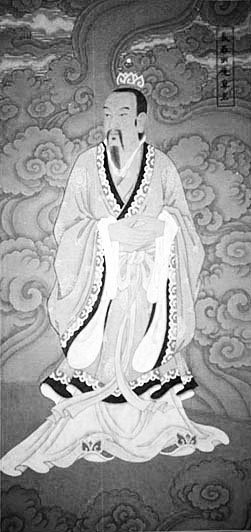Sages and Saints XVII:
白玉蟾
Bai Yuchan
Bai Yuchan (1194–1229?) was a well-known Daoist and alchemist. The following biography originates from The Supernatural Traces of Immortals and Buddhas 仙佛奇踪 from the Ming Dynasty:
葛長庚,宋瓊州人。母以白玉蟾名之,應夢也。年十二應童子科。後隱居於武夷山,號『東瓊子』。事陳翠虛九年,始得其道。蓬頭跣足,一衲弊甚。喜飲酒,未見其醉。博洽儒書,出言成章。嘗自讚云:「千古蓬頭跣足,一生服氣食霞。笑指五夷山下,白雲深處吾家。雷印常佩肘間,祈祉則有異應。」時言休咎,驚省聾俗。嘗在京都游西湖,至暮,墮水,舟人驚尋不見。達旦則玉蟾在水上,猶醺然也。一日,有持刀追脅者,玉蟾叱其人,刀向墮而走。玉蟾招之曰:「汝來,勿驚。」以刀還之。時稱玉蟾入水不濡,逢兵不害。宋嘉定中,詔征赴闕,對玉稱旨,命館太一宮。一日,不知所往。後每往來名山,神異莫測。
[Bai Yu’s common name was] Ge Changgeng, and he was a resident of Qiongzhou [i.e. Hainan Island] in the Song Dynasty. His mother named him after a white jade toad [i.e Bai Yuchan in English], which she happened to dream of [prior to his birth]. At the age of twelve, he passed the imperial youth examinations. Later he dwelled in seclusion on Mount Wuyi [in Fujian], with the appellation, Master of the Eastern Jade [i.e. Eastern Hainan]. It was only after serving Chen Cuixu [i.e. Chen Nan 陈楠] for nine years that he began to obtain [the teachings of] the dao from him. He had unkempt hair and walked around barefoot, [wearing] a badly torn patchwork vestment. He liked to drink alcohol but was never seen to be intoxicated. He had a rich and extensive [knowledge of] the Confucian books. He was of wide experience and had a great knowledge of the Confucian texts. When words emerged [from his mouth], they immediately turned into coherent compositions. On one occasion he praised himself: ‘In ten thousand ages [i.e. for all eternity], with unkempt hair and walking barefoot, only I in this lifetime ingest qi and eat the rosy clouds. I laugh while I point down from Mount Wuyi at the depths of the white clouds, where my home is. The thunder seal is constantly worn between my elbows [i.e. the waist]. When I pray with sincerely for happiness, there will definitely be an extraordinary response.’ At times he spoke of weal and woe, which startled the deaf and commoners and made them examine themselves within. On one occasion, he was in the capital city, while travelling to West Lake, when at dusk, he fell into water. The boatpeople there were shocked and searched for him, but he remained missing. At dawn, Bai Yuchan was [found] floating in the water, as though intoxicated. On another occasion, [a marauder] holding a knife rushed towards him. Bai Yuchan shouted at the person and the knife turned towards the ground and fell down upon it. The man ran away, but [Bai] Yuchan beckoned towards him and said: ‘You, come here, do not be frightened’. Then he returned the knife to him. Hence, from this time it was said that ‘the Jade Toad enters the waters without getting wet and encounters weapons without getting harmed’. In the Jiading [1208-1224] reign era of the Song Dynasty, the emperor invited him to visit the imperial palace, issued an imperial decree addressed directly to him, and hosted him at a building in the Taiyi palace [i.e. a temple complex]. One day, [he disappeared], and no one knew where he had gone. Thereafter, he went back and forth between the famous mountains, where [he performed] mystical and unfathomable [deeds].

Post-Scriptum: This article will be published as part of a book, entitled ‘The Arts of Daoism’ about meditation, stillness cultivation, abstention from grains [bi gu辟谷], sleeping gong [shui gong睡功], dreams, vegetarianism and diet in Daoism, formulae for fasting and meditation incense, including several chapters from the alchemical classic The Essentials of the Shortcut to the Great Achievement [da cheng jie yao 大成捷要]. It will be a mixture of anecdotal and oral transmissions from master Li Shi Fu, supported by translations of a number of chapters from ancient texts. It is set to be released March 2021, and a first draft has been already finalized.
Post-Post-Scriptum: The best way not to miss the release date is to register for free for the member area and newsletter: https://purplecloudinstitute.com/register/
